Abstract
AIMS: To analyse the significance of antibodies to p53 protein as a serological marker for changes in p53 gene expression in patients with hepatocellular carcinoma. METHODS: Thirty eight patients with hepatocellular carcinoma, 19 showing accumulation of p53 protein by immunohistochemistry and 19 having no accumulation, were studied. The presence of anti-p53 was tested using a novel ELISA utilising a recombinant p53 protein as a capture system and verified by western blotting. p53 gene mutations were sought by single strand conformational polymorphism and DNA sequencing analyses. RESULTS: Of 19 patients with p53 protein accumulation in tumour tissue, 10 (52%) had antibodies to p53 in serum by ELISA. Four patients with p53 negative immunohistochemistry also had detectable anti-p53. Western blot analysis confirmed the specificity of the ELISA positive serum samples. The presence of anti-p53 was independent of serum alpha-fetoprotein and was detected in 50% of small tumours while only 8% were alpha-fetoprotein positive. Mutations affecting exons 5 and 6 seem to be more frequently associated with development of anti-p53, than mutations in exons 7 or 8. CONCLUSIONS: The ELISA for anti-p53 is a convenient and specific tet for the detection of humoral response to alterations in p53 gene expression and could be of value in the diagnosis and characterisation of patients with hepatocellular carcinoma.
Full text
PDF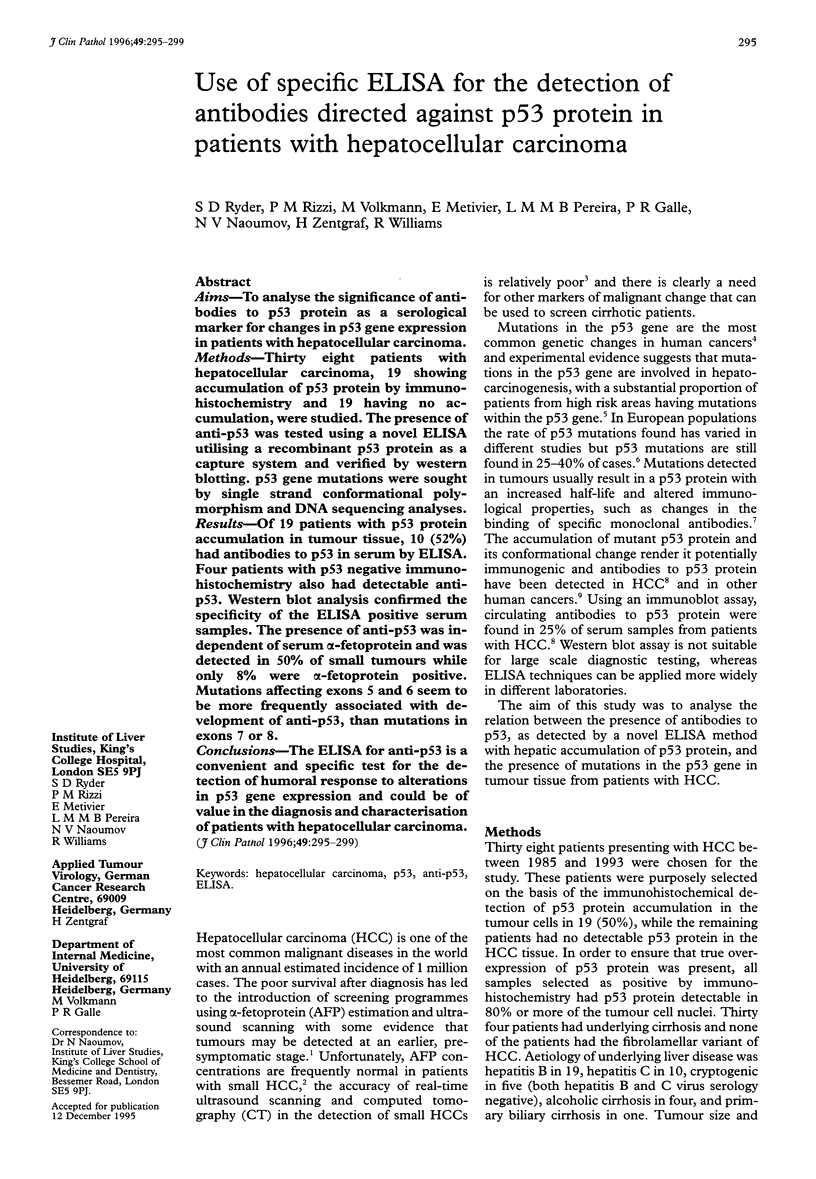
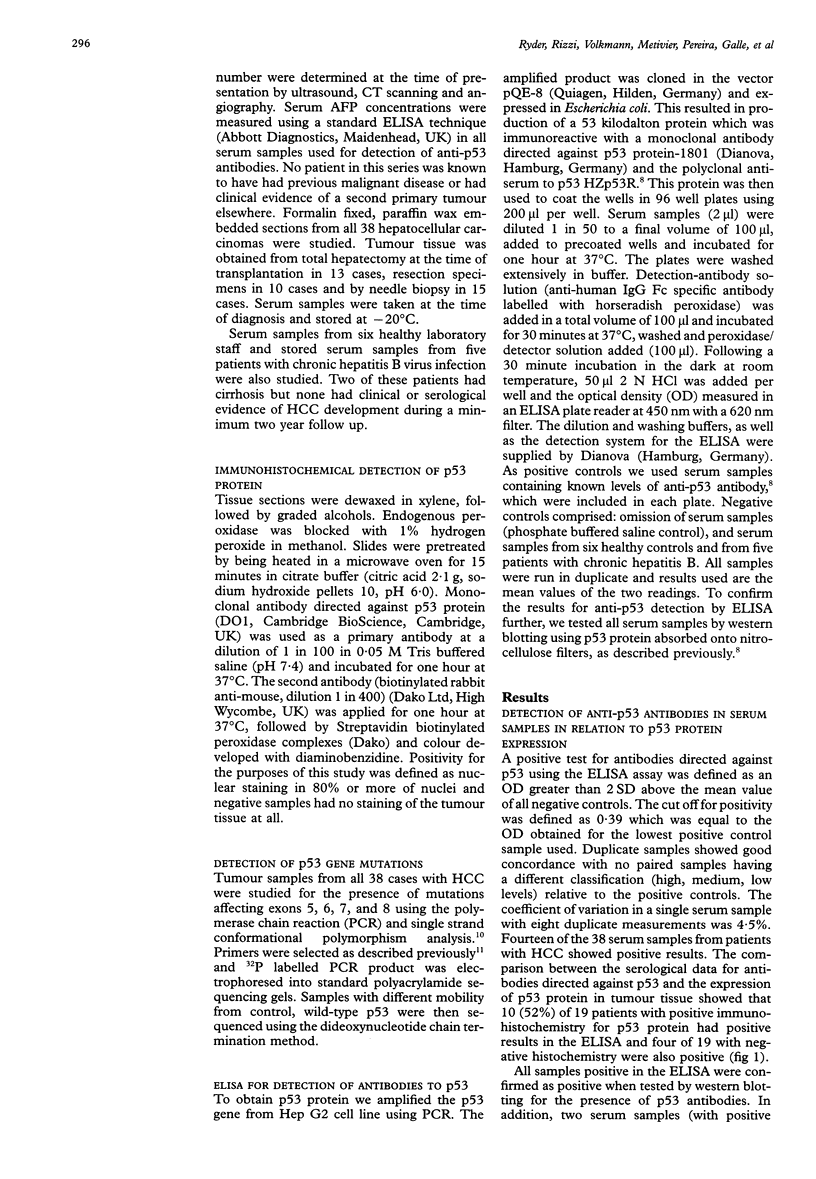
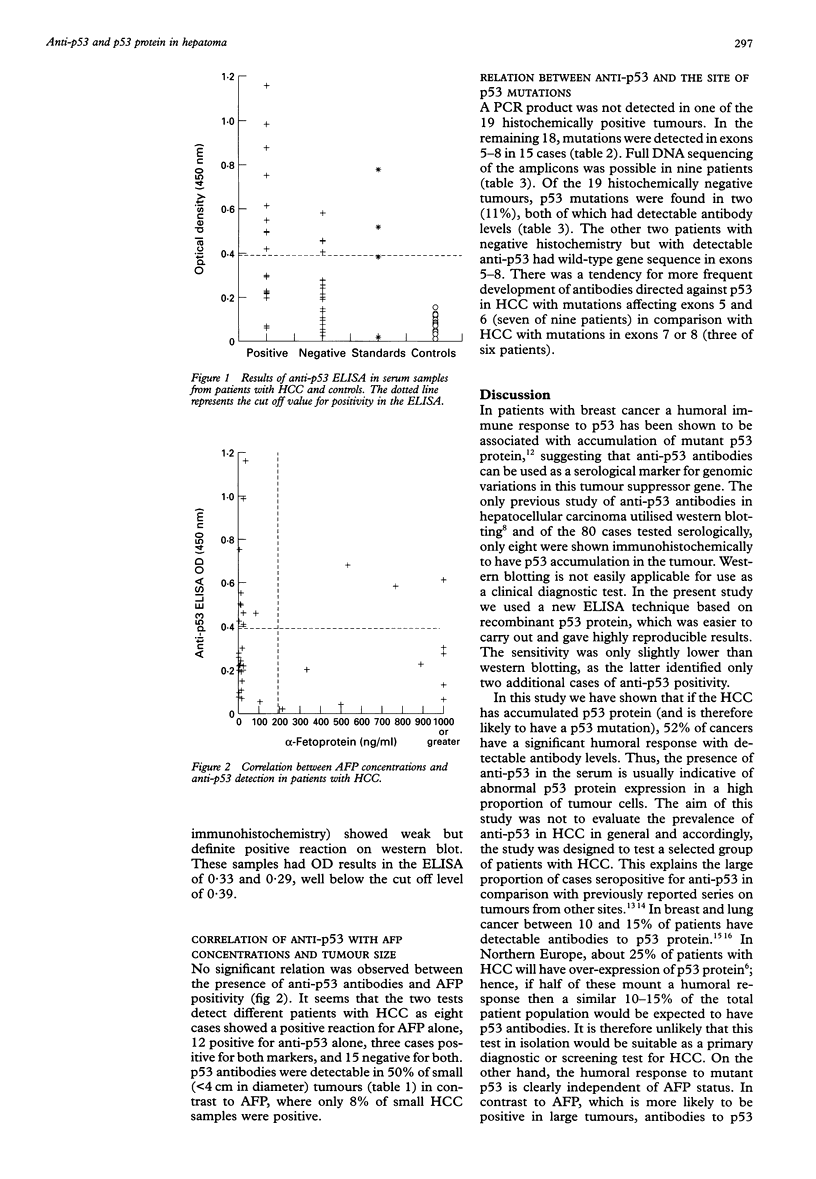
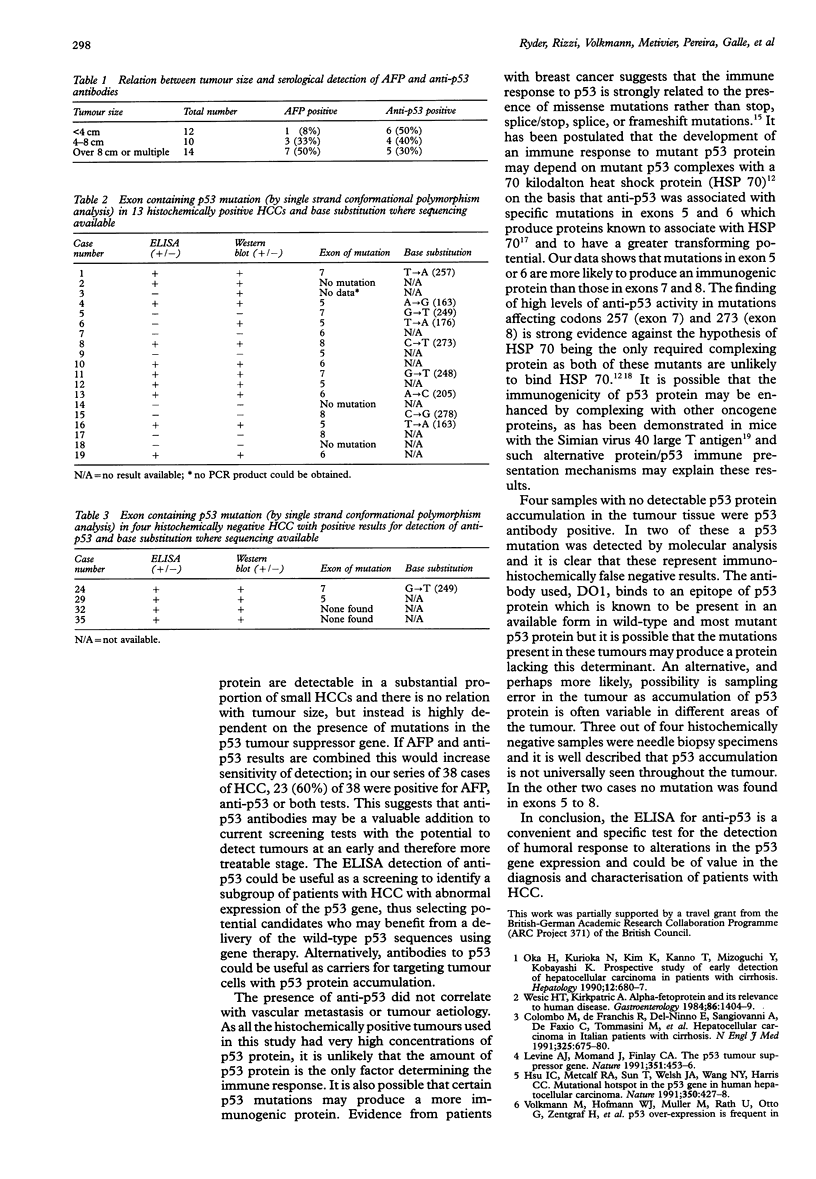
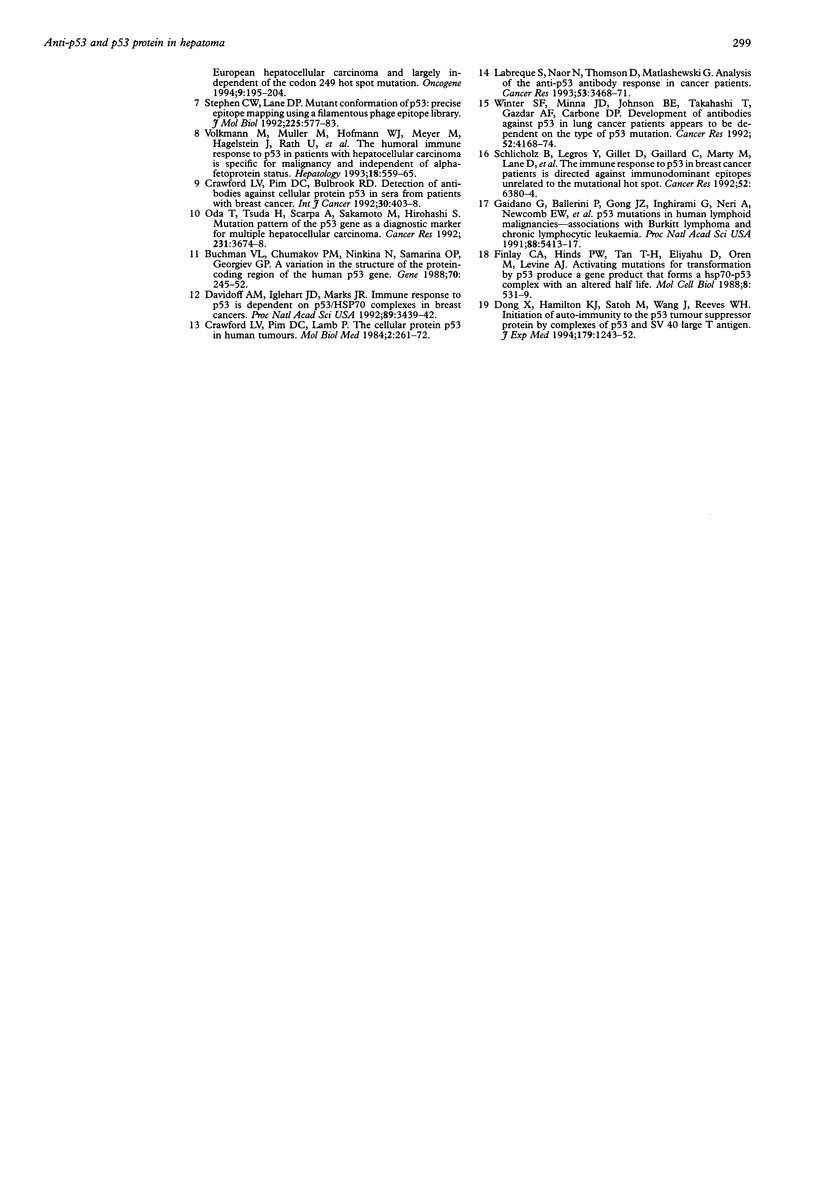
Selected References
These references are in PubMed. This may not be the complete list of references from this article.
- Buchman V. L., Chumakov P. M., Ninkina N. N., Samarina O. P., Georgiev G. P. A variation in the structure of the protein-coding region of the human p53 gene. Gene. 1988 Oct 30;70(2):245–252. doi: 10.1016/0378-1119(88)90196-5. [DOI] [PubMed] [Google Scholar]
- Chen D. S., Sung J. L., Sheu J. C., Lai M. Y., How S. W., Hsu H. C., Lee C. S., Wei T. C. Serum alpha-fetoprotein in the early stage of human hepatocellular carcinoma. Gastroenterology. 1984 Jun;86(6):1404–1409. [PubMed] [Google Scholar]
- Colombo M., de Franchis R., Del Ninno E., Sangiovanni A., De Fazio C., Tommasini M., Donato M. F., Piva A., Di Carlo V., Dioguardi N. Hepatocellular carcinoma in Italian patients with cirrhosis. N Engl J Med. 1991 Sep 5;325(10):675–680. doi: 10.1056/NEJM199109053251002. [DOI] [PubMed] [Google Scholar]
- Crawford L. V., Pim D. C., Bulbrook R. D. Detection of antibodies against the cellular protein p53 in sera from patients with breast cancer. Int J Cancer. 1982 Oct 15;30(4):403–408. doi: 10.1002/ijc.2910300404. [DOI] [PubMed] [Google Scholar]
- Crawford L. V., Pim D. C., Lamb P. The cellular protein p53 in human tumours. Mol Biol Med. 1984 Aug;2(4):261–272. [PubMed] [Google Scholar]
- Davidoff A. M., Iglehart J. D., Marks J. R. Immune response to p53 is dependent upon p53/HSP70 complexes in breast cancers. Proc Natl Acad Sci U S A. 1992 Apr 15;89(8):3439–3442. doi: 10.1073/pnas.89.8.3439. [DOI] [PMC free article] [PubMed] [Google Scholar]
- Dong X., Hamilton K. J., Satoh M., Wang J., Reeves W. H. Initiation of autoimmunity to the p53 tumor suppressor protein by complexes of p53 and SV40 large T antigen. J Exp Med. 1994 Apr 1;179(4):1243–1252. doi: 10.1084/jem.179.4.1243. [DOI] [PMC free article] [PubMed] [Google Scholar]
- Finlay C. A., Hinds P. W., Tan T. H., Eliyahu D., Oren M., Levine A. J. Activating mutations for transformation by p53 produce a gene product that forms an hsc70-p53 complex with an altered half-life. Mol Cell Biol. 1988 Feb;8(2):531–539. doi: 10.1128/mcb.8.2.531. [DOI] [PMC free article] [PubMed] [Google Scholar]
- Gaidano G., Ballerini P., Gong J. Z., Inghirami G., Neri A., Newcomb E. W., Magrath I. T., Knowles D. M., Dalla-Favera R. p53 mutations in human lymphoid malignancies: association with Burkitt lymphoma and chronic lymphocytic leukemia. Proc Natl Acad Sci U S A. 1991 Jun 15;88(12):5413–5417. doi: 10.1073/pnas.88.12.5413. [DOI] [PMC free article] [PubMed] [Google Scholar]
- Hsu I. C., Metcalf R. A., Sun T., Welsh J. A., Wang N. J., Harris C. C. Mutational hotspot in the p53 gene in human hepatocellular carcinomas. Nature. 1991 Apr 4;350(6317):427–428. doi: 10.1038/350427a0. [DOI] [PubMed] [Google Scholar]
- Labrecque S., Naor N., Thomson D., Matlashewski G. Analysis of the anti-p53 antibody response in cancer patients. Cancer Res. 1993 Aug 1;53(15):3468–3471. [PubMed] [Google Scholar]
- Levine A. J., Momand J., Finlay C. A. The p53 tumour suppressor gene. Nature. 1991 Jun 6;351(6326):453–456. doi: 10.1038/351453a0. [DOI] [PubMed] [Google Scholar]
- Oda T., Tsuda H., Scarpa A., Sakamoto M., Hirohashi S. Mutation pattern of the p53 gene as a diagnostic marker for multiple hepatocellular carcinoma. Cancer Res. 1992 Jul 1;52(13):3674–3678. [PubMed] [Google Scholar]
- Oka H., Kurioka N., Kim K., Kanno T., Kuroki T., Mizoguchi Y., Kobayashi K. Prospective study of early detection of hepatocellular carcinoma in patients with cirrhosis. Hepatology. 1990 Oct;12(4 Pt 1):680–687. doi: 10.1002/hep.1840120411. [DOI] [PubMed] [Google Scholar]
- Schlichtholz B., Legros Y., Gillet D., Gaillard C., Marty M., Lane D., Calvo F., Soussi T. The immune response to p53 in breast cancer patients is directed against immunodominant epitopes unrelated to the mutational hot spot. Cancer Res. 1992 Nov 15;52(22):6380–6384. [PubMed] [Google Scholar]
- Stephen C. W., Lane D. P. Mutant conformation of p53. Precise epitope mapping using a filamentous phage epitope library. J Mol Biol. 1992 Jun 5;225(3):577–583. doi: 10.1016/0022-2836(92)90386-x. [DOI] [PubMed] [Google Scholar]
- Volkmann M., Müller M., Hofmann W. J., Meyer M., Hagelstein J., Räth U., Kommerell B., Zentgraf H., Galle P. R. The humoral immune response to p53 in patients with hepatocellular carcinoma is specific for malignancy and independent of the alpha-fetoprotein status. Hepatology. 1993 Sep;18(3):559–565. [PubMed] [Google Scholar]
- Winter S. F., Minna J. D., Johnson B. E., Takahashi T., Gazdar A. F., Carbone D. P. Development of antibodies against p53 in lung cancer patients appears to be dependent on the type of p53 mutation. Cancer Res. 1992 Aug 1;52(15):4168–4174. [PubMed] [Google Scholar]


